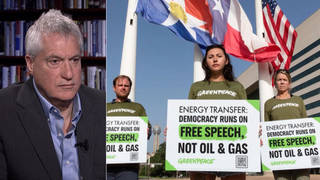
Topics
Guests
- David ButlerCahaba Riverkeeper. He has traveled to the site of the Colonial Pipeline Company disaster and is monitoring its environmental impacts.
We end today’s show looking at another pipeline. In Alabama, at least one worker has died and five have been hospitalized after a section of the Colonial pipeline exploded in Shelby County on Monday. This is the second shutdown in just as many months. The column of fire burning from the punctured pipeline reportedly reached 150 feet. This comes after the same pipeline leaked nearly 340,000 gallons of gasoline in Central Alabama in September, forcing the line to shut down for 12 days and leading six governors to declare states of emergency as gas prices rose throughout the region. Since 2006, the company has reported 178 spills and other incidents that released a combined 193,000 gallons of hazardous liquids and caused $39 million in property damage. We speak to David Butler, the Cahaba Riverkeeper. He has traveled to the site of the Colonial Pipeline Company disaster and is monitoring its environmental impacts.
Transcript
NERMEEN SHAIKH: We end today’s show looking at another pipeline. In Alabama, at least one worker has died and five have been hospitalized after a section of the Colonial pipeline exploded in Shelby County on Monday. This is the second shutdown in just as many months. The column of fire burning from the punctured pipeline reportedly reached 150 feet. Eyewitnesses described the disaster to ABC News.
EYEWITNESS 1: It’s smoking!
EYEWITNESS 2: It looked like there was like a plane crash. I’ve never seen anything like this.
NERMEEN SHAIKH: This comes after the same pipeline leaked nearly 340,000 gallons of gasoline in Central Alabama in September, forcing the line to shut down for 12 days and leading six governors to declare states of emergency as gas prices rose throughout the region. Since 2006, the company has reported 178 spills and other incidents that released a combined 193,000 gallons of hazardous liquids and caused $39 million in property damage.
AMY GOODMAN: Now Democrats on the House Energy and Commerce Committee are seeking an investigation of the Georgia-based company.
Well, Democracy Now! invited Colonial Pipeline Company to join us on the show; they declined. We’re going to Birmingham, Alabama, where we’re joined by David Butler, the Cahaba Riverkeeper. He has traveled to the site of the Colonial Pipeline Company disaster, is monitoring its environmental impacts.
David, welcome to Democracy Now! We only have a few minutes. Can you describe what’s happening there?
DAVID BUTLER: Yeah, absolutely. First, you know, we want to express our condolences to the worker that passed away and also the workers that are injured. And what happened was, they were doing some routine work on the pipeline in preparation for the repair that they need to do on the previous leak site, and there was a contact with the pipe, and caused an explosion.
NERMEEN SHAIKH: But tell us a little bit about the ecosystem of this river. There are reportedly more species of fish in the Cahaba River than there are in the whole state of California.
DAVID BUTLER: Absolutely. It’s a tremendously unique ecosystem. And the area that the pipeline is in is tremendously sensitive. And, you know, certainly, our work is centered around preserving and protecting what’s left.
AMY GOODMAN: David, if you can just talk about what you know about this explosion and the accident that happened a few months ago? I mean, we’re in the midst of a presidential election year; not one reporter in the debates asked about the issue of climate change, of the presidential candidates. But what is happening right now? What is this Colonial pipeline? How long is it? Six governors—in the last explosion, six governors declared a state of emergency?
DAVID BUTLER: Yeah. And, you know, it’s been one of the disappointing aspects of the story, to us, is that, you know, really, the national media focus has been on the supply issue and not so much the environmental impact of incidents like this and sort of the long-term outlook for having pipelines crisscrossing all over the country.
AMY GOODMAN: And who is running the Colonial Pipeline Company? Who do you hold responsible? What are they saying?
DAVID BUTLER: Well, we’ve been in constant contact. And certainly, there’s kind of two issues. There’s the issue of why did it happen. And we’re still, like everybody else, kind of looking for answers, you know, to explain the previous leak and also this one. And then there’s the issue of how they’ve responded. And, you know, it’s been really surprising to us that they’ve allowed us complete access. They’ve been incredibly transparent with us and continue to allow me access to both the river in the area and any information that we want about, you know, what they’re doing and how they plan to protect the river.
AMY GOODMAN: Well, David Butler, we want to thank you for being with us, Cahaba Riverkeeper, traveled the site—to the site of the Colonial Pipeline Company disaster, monitoring the environmental impacts.
That does it for our show. We’ll be doing a five-hour special on election night from 7:00 Eastern time in the evening until midnight. We hope you tune in at democracynow.org or your station runs us. Tune in there.












Media Options